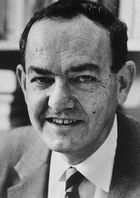| Profile | Major Works | Resources |
Herbert A. Simon, 1916-2001


Pioneer of behavioral economics.
There are many that claim that Herbert A. Simon has precipitated something like a revolution in microeconomics. This revolution is in the concept of "decision-making" in organization and under uncertainty, which he claims is far away from the "rational man" often assumed in mainstream microeconomics. He is certainly not the first one to come up with this critique, but he is by far the best known in this regard - and won a Nobel Memorial prize for it in 1978.
Herbert Alexander Simon was trained at the University of Chicago, obtaining his BA in 1936 and a Ph.D. in political science in 1943. From 1949, Simon was a professor of administration and psychology and eventually also computer science at the Carnegie Institute of Technology (now Carnegie-Mellon).
Simon actually started his economic life at the Cowles Commission and some of his first few contributions were in that vein. Of notable importance was his 1949 article unveiling the "Hawkins-Simon" conditions for non- negative square matrices.
Simon subsequently began working on industrial organization and, among the various things he found, already announced in his early 1947 work, was that both the internal organization of firms and the external business decisions of firms seems to conform poorly with the Neoclassical theories of "rational" decision-making. In an avalanche of articles and books since the 1950s, Simon has focused much of his attention on the issue of decision-making - and has come up with a behavioral theory based on "bounded rationality". Agents, he claim, face uncertainty about the future and costs in acquiring information in the present. These two factors, thus, limit the extent to which agents can make a fully rational decision. Thus, Simon claims, they have only "bounded rationality" and are forced to make decisions not by "maximization" by "satisficing", i.e. setting an aspiration level which, if achieved, they will be happy enough with, and if they don't, try to change either their aspiration level or their decision. These "rules of thumb" are the utmost agents can achieve in the "bounded" and uncertain real world.
Simon has backed up much of his work with numerous studies on decision-making in business enterprise. Out of this, the "new" theory of the firm as a "satisficing" as opposed to "maximizing" agent has begun to take hold in industrial organization. In general, Simon's theories of bounded rationality have become an integral part of the so-called "New Institutionalist Economics".
Herbert Simon went beyond economics to psychology and computer science, in pursuit of his grand goal of understanding not only human decision-making in organizations, but the nature of thinking itself. In Simon's view, the human mind is "wonderful, but not incomprehensible", and thoughtful decisions - rational, bounded, intuitive and/or creative - can be modeled. For his efforts in computer science and artificial intelligence, Simon received the Turing Award in 1975 along with his frequent co-writer Allen Newell.
|
Major Works of Herbert A. Simon
|
HET
|
|
Resources on Herbert A. Simon
|
All rights reserved, Gonçalo L. Fonseca
